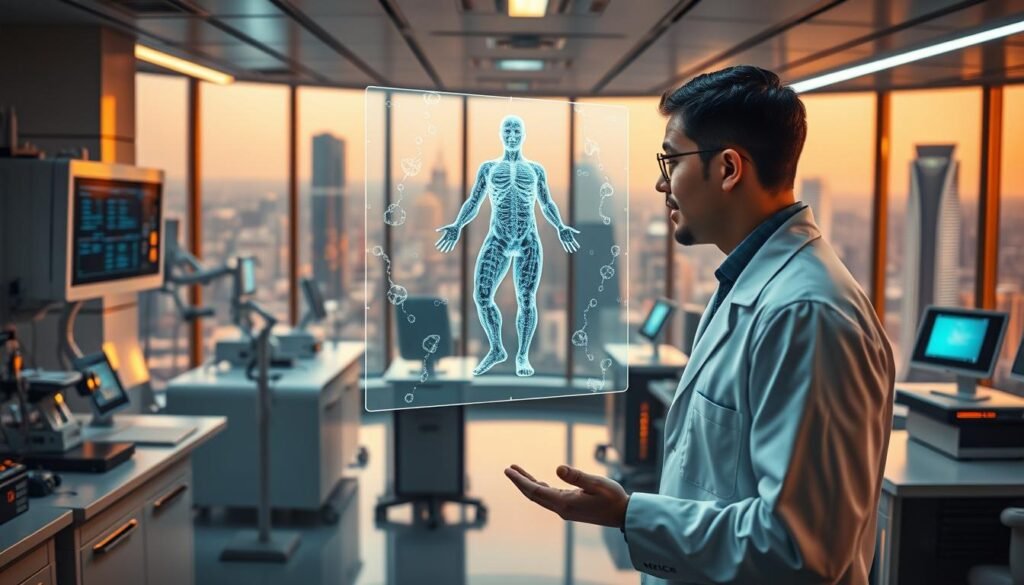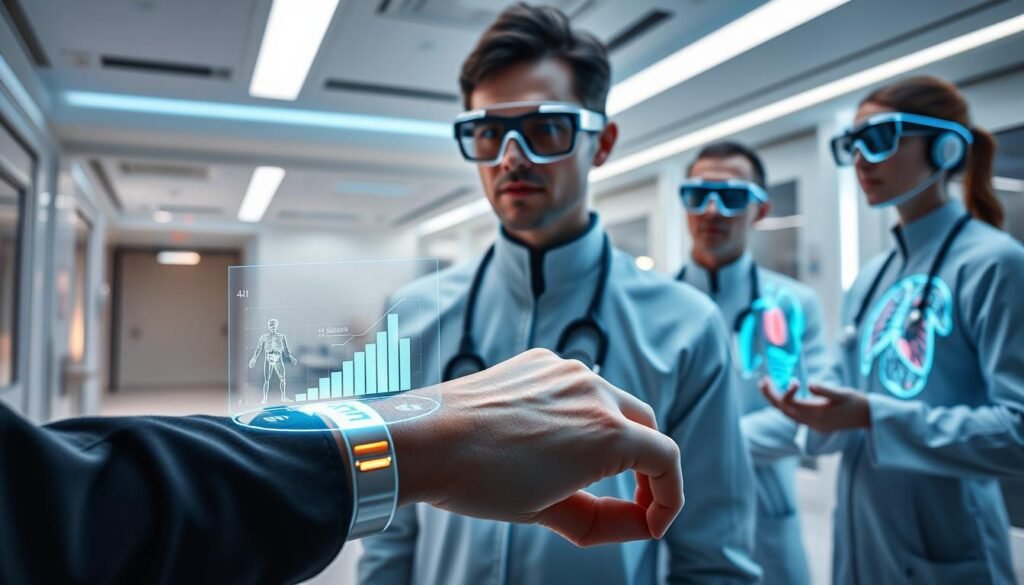Did you know the global market for Artificial Intelligence in Healthcare is set to hit $36 billion by 2025? This huge growth shows how AI is changing patient care, diagnosis, and treatment worldwide. It’s making a big impact in India too.
Exploring this change, we see that AI is more than just an update. It’s key to solving many healthcare problems. By using AI for diagnosis and treatment, we can improve patient care. This keeps us leading in new healthcare methods.
Introduction to Artificial Intelligence in Healthcare
Artificial intelligence is changing healthcare in big ways. It lets machines understand data, make choices, and learn from what they do. This new tech is making healthcare better and more efficient.
What is Artificial Intelligence?
Artificial intelligence is about making machines think like humans. They can solve problems, learn, and adapt to new info. Thanks to better computers and more data, AI is now used in many fields. In healthcare, it helps doctors make better choices by analyzing lots of data.
Overview of AI Technologies in Healthcare
There are many AI technologies important in healthcare. Some key ones are:
- Machine Learning – Gets better with time, helping with diagnosis and treatment plans.
- Natural Language Processing – Makes sense of doctor notes, research, and patient talks.
- Robotic Process Automation – Makes tasks like scheduling and billing faster and easier.
These AI tools are changing healthcare for the better. They help with imaging and patient care, making a big difference in the medical world.
Benefits of AI in Healthcare
AI is changing healthcare in big ways. It’s not just about making things faster. It’s about making healthcare better for patients, more efficient, and cheaper. Let’s look at how AI improves patient care, makes treatments more effective, and saves money.
Improved Patient Outcomes
AI helps doctors make better treatment plans. It uses smart algorithms to understand patient data. This leads to accurate diagnoses and treatments that really work.
This approach cuts down on mistakes. It also helps patients get better faster. AI is making a big difference in healthcare.
Increased Efficiency in Treatment
Healthcare often gets slow because of too many patients. AI fixes this by automating tasks. It makes scheduling and data entry faster.
This means doctors can spend more time with patients. It makes treatments more effective.
Cost Reduction in Healthcare Services
AI also saves money in healthcare. It automates tasks, which cuts down on labor costs. Plus, it helps doctors avoid unnecessary tests.
This saves money and helps keep care quality high. It’s a win-win for everyone involved.
AI in Diagnostic Processes
AI is changing how we diagnose diseases in healthcare. It uses new AI imaging tech to help doctors better understand medical images. This tech helps spot diseases early, leading to better health outcomes for patients.
AI-Powered Imaging Solutions
AI imaging solutions use deep learning to analyze medical images. They look at MRI, CT scans, and X-rays. This makes it easier for doctors to find problems that are hard to see.
Early Disease Detection Algorithms
AI helps find diseases early by looking at patient data and risk factors. It uses machine learning to predict when diseases might start. This means doctors can treat patients sooner, improving their chances of getting better.
AI in Personalized Medicine
Artificial Intelligence is key in making personalized medicine better. It uses data to create treatments that fit each person’s unique needs. This way, treatments work better and cause fewer side effects.
Tailoring Treatments Through Data Analysis
Healthcare providers use advanced data analysis to tailor treatments. They use algorithms to look at lots of patient data, like genetic info. This helps find the best treatment plans for each patient.
This approach makes treatment faster and improves patient happiness. It also makes patients more involved in their care.
Role of Genomics in AI Applications
Genomics is very important in AI and genomics in personalized medicine. It helps doctors use genetic info to make better decisions. This mix of genomics and AI leads to new ways to care for patients.

AI in Patient Management
Artificial intelligence has changed healthcare a lot. It brings new tools like virtual health assistants and remote monitoring. These help doctors talk better with patients and keep them on track with treatments.
Virtual Health Assistants
Virtual health assistants are key in AI patient care. They can send reminders, book appointments, and answer health questions. They give quick, right answers, making health care better.
These tools support patients on their health journey. This support leads to better health results.
Remote Patient Monitoring Technologies
Remote monitoring is a big step in health care. It uses AI to watch health signs and metrics. For example, wearables and apps send heart rate and blood sugar info to doctors.
This tech lets patients take care of themselves more. It also helps doctors act fast when needed. This makes health care more proactive.
| Feature | Virtual Health Assistants | Remote Patient Monitoring Solutions |
|---|---|---|
| Interaction Type | Patient-focused communication | Data collection and alert systems |
| Real-time Monitoring | No | Yes |
| Patient Engagement | High | Moderate |
| Healthcare Provider Support | General inquiries | Real-time data analysis |
As AI in patient care grows, we’ll see even more improvements. Healthcare will get better, and patient-doctor relationships will strengthen.
Ethical Considerations of AI in Healthcare
AI is changing healthcare in big ways, but we must think about ethics. Keeping patient data safe is key, as it’s used in AI. We must protect this data from being stolen or leaked.
Patient Privacy and Data Security
Keeping patient info private is very important with AI in healthcare. Companies need to use strong security to keep data safe. This means using top-notch encryption and following the rules.
They also need to be open about how they use AI. This builds trust with patients. It shows they care about keeping data safe and using AI wisely.
Bias in AI Algorithms
AI can sometimes make unfair choices, which is a big problem. If AI is trained on the wrong data, it might not work right for everyone. We need to use a wide range of data to train AI.
This makes sure AI works well for all kinds of people. We also need to keep checking AI to make sure it’s fair. This way, we can fix any problems and make AI better for healthcare.

| Aspect | Importance | Example Actions |
|---|---|---|
| Data Security | Protects patient privacy | Implement encryption, access controls |
| Bias Mitigation | Ensures fair treatment | Diverse datasets, ongoing auditing |
| Transparency | Builds trust | Clear communication of AI capabilities |
Case Studies of AI Implementation in India
India’s healthcare is changing fast, thanks to new technology. AI is helping doctors make better diagnoses and reach more people, even in rural areas. By mixing AI with old healthcare ways, doctors are seeing better results and working more efficiently.
AI in Radiology and Imaging
AI is making a big difference in radiology in India. Hospitals are using AI to help doctors spot problems in images more accurately. These tools use advanced algorithms to find diseases like cancer early.
This means doctors can act faster, reducing mistakes and saving lives. It’s a big step forward in healthcare.
AI-Driven Telemedicine Solutions
Telemedicine is changing healthcare in India, reaching people in remote places. AI helps doctors see patients from anywhere, making care more accessible. It helps sort out who needs help right away.
This is key for areas that often lack access to healthcare. It ensures everyone gets the care they need.
Future Trends in AI for Healthcare
Looking ahead, healthcare will see big changes with new technologies. Using the latest innovations is key to improving patient care. AI and wearable tech are merging, leading to better health monitoring and care plans.
Integration of AI with Wearable Technology
AI in wearable tech is exciting for health tracking. Devices collect data like heart rates and activity. AI makes sense of this data, helping doctors act fast.
This quick feedback loop leads to care plans made just for you. It boosts your health and wellness.
Advancements in Predictive Analytics
Predictive analytics in healthcare is growing fast. It helps spot risks and prevent problems. AI looks at past data to predict health issues.
Doctors can then plan better for chronic conditions or emergencies. This approach makes healthcare more proactive and efficient.

Challenges of Implementing AI in Healthcare
Introducing artificial intelligence in healthcare comes with its own set of hurdles. As companies try to use advanced AI, they face several challenges. These are mainly due to healthcare infrastructure and the lack of skilled AI professionals in healthcare. It’s important to tackle these problems to make healthcare more data-driven.
Infrastructure Limitations
Today’s healthcare setup often can’t handle the complex needs of AI. Many places have old systems that make it hard to add new tech. This leads to slow data sharing, long wait times, and less efficiency.
To fix this, investing in strong tech is key. This ensures AI works well, improving care and operations.
Need for Skilled Professionals
Having enough skilled AI experts in healthcare is a big challenge. There are few people who know both healthcare and AI well. This shortage slows down progress.
It’s important to keep training and educating healthcare workers. They need to know how to use AI well. This team will help unlock AI’s full benefits, leading to better care and efficiency.
Regulatory and Policy Framework
Artificial intelligence is changing healthcare in India. It’s important to know the rules. The current rules mix old healthcare policies with new AI laws. They aim to be fair and encourage new ideas in healthcare.
Overview of Current Regulations in India
The rules for AI in healthcare in India are changing fast. Groups like the Ministry of Health and the NITI Aayog are key in making these rules. They focus on keeping patient data safe and following healthcare standards.
The goal is to reduce risks from AI and make patients trust it more.
Future Directions for AI Regulation
The future of AI rules will aim for a balance. Policymakers want laws that help AI grow but keep everyone safe. Working together, tech companies and healthcare will be key in setting good rules.
Keeping an eye on these rules and changing them as needed will help. This way, AI can bring its best to healthcare.

The Role of Major Tech Companies
Big tech companies in healthcare have made big steps in using artificial intelligence. They’ve made healthcare better by using new tech. Companies like Google and IBM lead the way, making healthcare better and easier. Also, Indian AI startups offer creative solutions for local health problems.
Contributions of Google and IBM in Healthcare
Google and IBM have started many AI projects. Google’s DeepMind made new ways to look at medical images, making doctors better at finding problems. IBM’s Watson helps doctors make plans just for each patient, using all their health data.
Indian Startups Pioneering AI Innovations
In India, new AI startups are growing fast. They’re making tools to help find and treat diseases. Companies like Niramai and SigTuple are tackling big health challenges in India. They show how AI can really help healthcare.
| Company | AI Contribution | Sector Focus |
|---|---|---|
| Google DeepMind | Advanced imaging algorithms | Diagnostic Radiology |
| IBM Watson | Data analytics for personalized medicine | Oncology |
| Niramai | AI-based breast cancer screening | Preventive Care |
| SigTuple | Automated analysis of medical images | Pathology |
Tech companies in healthcare are changing the game. They show how AI can solve big health problems. Working together, big names and new startups are making healthcare better for everyone.
Conclusion: Embracing the Future of Healthcare with AI
Artificial intelligence has changed healthcare a lot. We’re on the edge of a big change. AI is making patient care better in many ways.
It’s changing how we diagnose and treat patients. This shift is making care better and more efficient. It’s a big improvement.
Using AI in healthcare needs teamwork. Doctors, tech experts, and leaders must work together. This teamwork is key to making AI work well for patients.
By working together, we can make healthcare better with technology. This effort will bring big changes that help both patients and doctors.
The future of healthcare with AI is very promising. By embracing AI, we get the tools for a better future. We invite everyone to join us in making healthcare better.
We aim for a future where care is improved and new discoveries are made. Together, we can achieve this.




